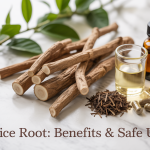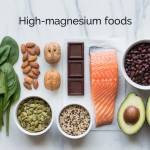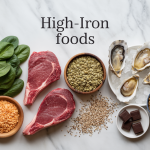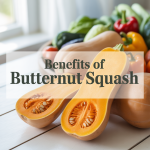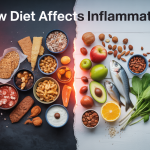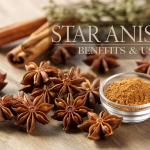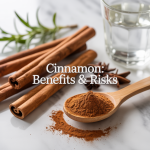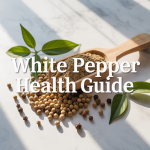Nettle tea has gained popularity as a natural remedy packed with vitamins, minerals, and antioxidants that may support your overall health. This herbal drink is perfect for health-conscious individuals, natural wellness enthusiasts, and anyone curious about adding beneficial teas to their daily routine.
Many people wonder about nettle tea’s actual health benefits and whether it’s safe to drink regularly. You’ll discover the science-backed advantages this earthy tea offers, from reducing inflammation to supporting kidney health. We’ll also cover the potential risks and side effects you should know before making nettle tea part of your wellness routine.
Ready to brew your first cup? This guide includes simple preparation methods that help you get the most from your nettle tea, plus tips for drinking it safely and effectively.
What is Nettle Tea and Its Nutritional Profile
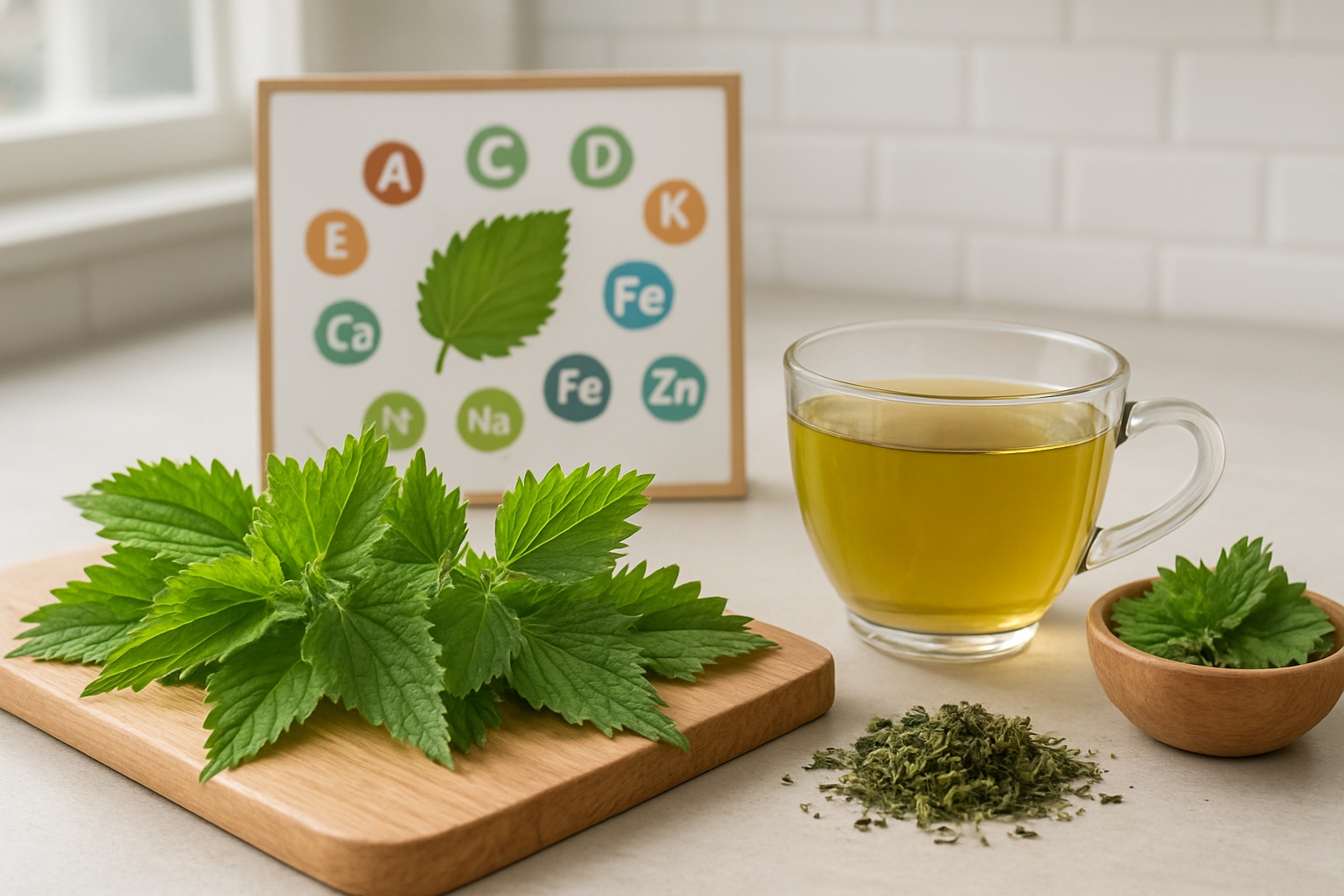
Understanding the Nettle Plant and Its Active Compounds
Stinging nettle (Urtica dioica) is a perennial herbaceous plant that grows wild across Europe, North America, and parts of Asia. Despite its intimidating reputation for causing painful stings when touched fresh, this remarkable plant has been used medicinally for thousands of years. The plant’s leaves contain tiny hairs called trichomes that release irritating compounds like histamine and formic acid when touched, but these compounds break down during the drying and steeping process.
The magic of nettle tea lies in its bioactive compounds. The leaves contain powerful flavonoids such as quercetin, kaempferol, and rutin, which act as natural antioxidants. These compounds help protect cells from oxidative stress and inflammation. Nettle also contains unique plant sterols, including beta-sitosterol, which may support hormone balance and prostate health.
Another key group of compounds found in nettle are the phenolic acids, particularly caffeic acid and chlorogenic acid. These substances contribute to the tea’s anti-inflammatory properties and may help regulate blood sugar levels. The plant also contains natural antihistamines, which is why nettle tea is often recommended for seasonal allergies.
Key Vitamins and Minerals Found in Nettle Tea
Nettle tea is packed with essential nutrients that make it a true superfood beverage. The vitamin profile is impressive, with high levels of vitamin A supporting eye health and immune function. The tea also provides significant amounts of vitamin C, offering about 42mg per cup, which is roughly half the daily recommended intake for adults.
The B-vitamin complex is well-represented in nettle tea, including folate, riboflavin, and thiamine. These vitamins play crucial roles in energy metabolism and nervous system function. Vitamin K is another standout nutrient, important for bone health and blood clotting.
The mineral content of nettle tea is equally remarkable:
| Mineral | Amount per Cup | Primary Benefits |
|---|---|---|
| Iron | 1.6mg | Prevents anemia, supports oxygen transport |
| Calcium | 481mg | Bone and teeth health, muscle function |
| Potassium | 297mg | Heart health, blood pressure regulation |
| Magnesium | 87mg | Muscle and nerve function, bone health |
| Phosphorus | 71mg | Bone formation, energy metabolism |
| Zinc | 0.34mg | Immune function, wound healing |
The bioavailability of these minerals from nettle tea is generally good, though the presence of natural compounds like tannins may slightly reduce absorption rates compared to synthetic supplements.
Comparing Fresh vs Dried Nettle for Tea Preparation
Both fresh and dried nettle leaves can be used to make tea, but each option offers distinct advantages and considerations. Fresh nettle leaves provide the highest concentration of water-soluble vitamins, particularly vitamin C, which degrades during the drying process. Fresh leaves also retain more of their volatile compounds and enzymes, potentially offering enhanced therapeutic benefits.
When using fresh nettle, you’ll need to handle the leaves carefully to avoid stings. Wearing gloves is essential during harvesting and preparation. The taste of fresh nettle tea tends to be more vibrant and grassier, with a slightly astringent quality that many people find refreshing.
Dried nettle, on the other hand, offers several practical advantages. The drying process concentrates certain minerals and makes the tea shelf-stable for months when stored properly. Dried nettle is also safer to handle and more convenient for daily use. The flavor profile is milder and earthier compared to fresh leaves, making it more palatable for beginners.
From a nutritional standpoint, dried nettle retains most of its mineral content and many of its beneficial compounds. While some vitamin C is lost during drying, the difference isn’t dramatic enough to significantly impact the tea’s overall health benefits. Many herbalists actually prefer dried nettle for therapeutic purposes because the concentrated nature makes it easier to achieve consistent dosing.
The choice between fresh and dried often comes down to availability and personal preference. Fresh nettle is seasonal and requires immediate use, while dried nettle offers year-round convenience without compromising most of the plant’s beneficial properties.
Proven Health Benefits of Drinking Nettle Tea
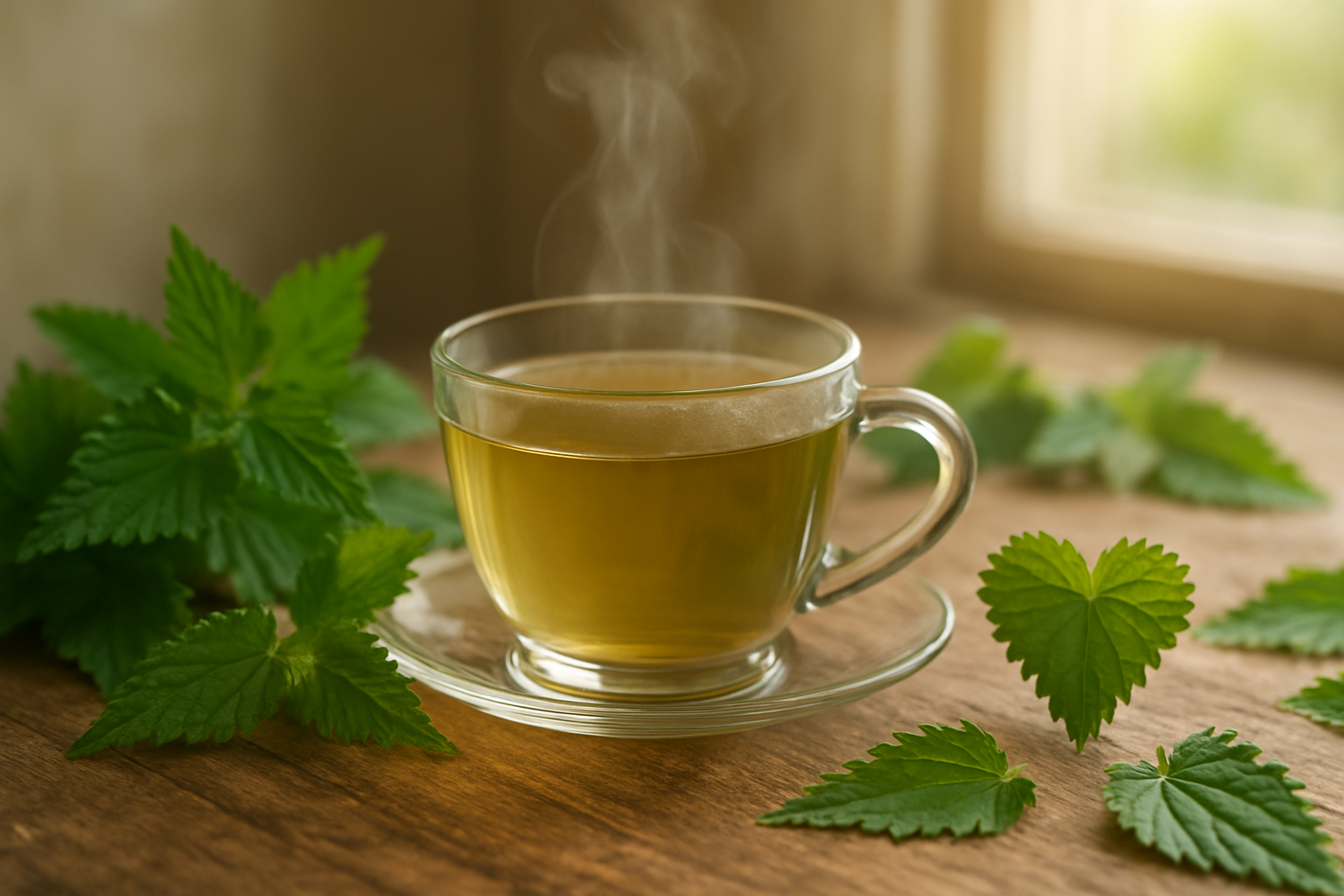
Natural Anti-Inflammatory Properties for Joint Health
Stinging nettle contains powerful compounds that work like nature’s own anti-inflammatory medicine. The plant’s leaves are packed with bioactive substances including quercetin, kaempferol, and caffeic acid – all of which help reduce inflammation throughout your body. Research shows that people who drink nettle tea regularly experience less joint stiffness and pain, especially those dealing with arthritis or rheumatism.
The secret lies in nettle’s ability to interfere with inflammatory pathways at the cellular level. These compounds block the production of inflammatory enzymes and cytokines that cause swelling and discomfort in your joints. Many people find that incorporating nettle tea into their daily routine helps them move more freely and reduces their reliance on over-the-counter pain medications.
Studies have demonstrated that nettle extract can be as effective as some non-steroidal anti-inflammatory drugs (NSAIDs) for managing joint pain, but without the harsh side effects on your stomach or liver. Regular consumption may help protect cartilage from further damage while promoting better mobility and flexibility.
Supporting Healthy Blood Sugar Levels
Nettle tea acts as a natural blood sugar regulator, making it particularly valuable for people managing diabetes or pre-diabetes. The plant contains compounds that help your body process glucose more efficiently and improve insulin sensitivity. When you drink nettle tea with meals, it can help prevent those dramatic blood sugar spikes that leave you feeling tired and sluggish.
Research indicates that nettle’s active compounds work by slowing down the absorption of sugars in your intestines and enhancing your cells’ ability to take up glucose from the bloodstream. This dual action creates a more stable blood sugar profile throughout the day.
Several studies have shown that people who drink nettle tea regularly experience:
- Lower fasting blood glucose levels
- Improved glucose tolerance after meals
- Better long-term blood sugar control markers
- Reduced sugar cravings between meals
The polyphenols in nettle tea also protect your pancreatic cells from oxidative stress, helping preserve your body’s natural insulin production capacity over time.
Boosting Iron Absorption and Fighting Anemia
Iron deficiency affects millions of people worldwide, and nettle tea offers a natural solution that works on multiple levels. The plant itself contains a good amount of bioavailable iron, but more importantly, it enhances your body’s ability to absorb iron from other foods you eat.
Nettle tea is rich in vitamin C and other organic acids that convert iron into a form your body can easily use. When you drink nettle tea with iron-rich meals, you’re essentially giving your digestive system the tools it needs to extract maximum nutrition from your food. This makes it especially valuable for vegetarians and vegans who rely on plant-based iron sources.
People dealing with iron-deficiency anemia often notice improvements in their energy levels, mental clarity, and overall vitality within weeks of adding nettle tea to their routine. The combination of direct iron content and enhanced absorption creates a powerful one-two punch against iron deficiency.
Women who experience heavy menstrual periods find nettle tea particularly helpful for maintaining healthy iron levels throughout their cycle. The tea’s natural astringent properties may also help reduce excessive menstrual bleeding in some cases.
Enhancing Kidney Function and Natural Detoxification
Your kidneys work around the clock to filter waste and excess water from your blood, and nettle tea provides gentle support for these vital organs. The plant has mild diuretic properties, meaning it helps increase urine production without depleting your body of essential electrolytes like potassium and sodium.
This natural diuretic effect helps flush out toxins, excess salt, and metabolic waste products that can accumulate in your system. Unlike harsh pharmaceutical diuretics, nettle tea supports kidney function while maintaining your body’s mineral balance. Many people find it helpful for reducing water retention and bloating.
Nettle tea may also help prevent the formation of kidney stones by increasing urine volume and changing its chemical composition. The increased fluid flow helps prevent minerals from crystallizing and forming painful stones. Some research suggests that regular nettle tea consumption can reduce the risk of certain types of kidney stones.
The plant’s anti-inflammatory properties extend to the urinary tract, potentially helping with conditions like urinary tract infections and bladder inflammation. The gentle cleansing action supports your body’s natural detoxification processes without being harsh or depleting.
Strengthening Hair and Skin Health
Nettle tea works from the inside out to promote healthy, vibrant hair and clear skin. The plant’s rich mineral profile includes silica, sulfur, and potassium – all essential nutrients for strong hair growth and healthy skin cell regeneration. These minerals help build the structural proteins that give your hair its strength and your skin its elasticity.
The anti-inflammatory compounds in nettle tea can help calm skin conditions like eczema, acne, and general irritation. Many people notice their complexion becomes clearer and more even-toned after drinking nettle tea regularly for several weeks. The tea’s natural antihistamine effects may also help reduce skin reactions caused by allergies or environmental irritants.
For hair health, nettle tea provides nutrients that support follicle function and may help reduce hair loss. The plant contains compounds that can block DHT (dihydrotestosterone), a hormone linked to pattern baldness in both men and women. Some people use cooled nettle tea as a hair rinse after shampooing, while others prefer to drink it for systemic benefits.
The vitamin C content in nettle tea supports collagen production, which keeps your skin firm and youthful-looking. Regular consumption may help reduce the appearance of fine lines and improve overall skin texture and tone.
Potential Risks and Side Effects to Consider
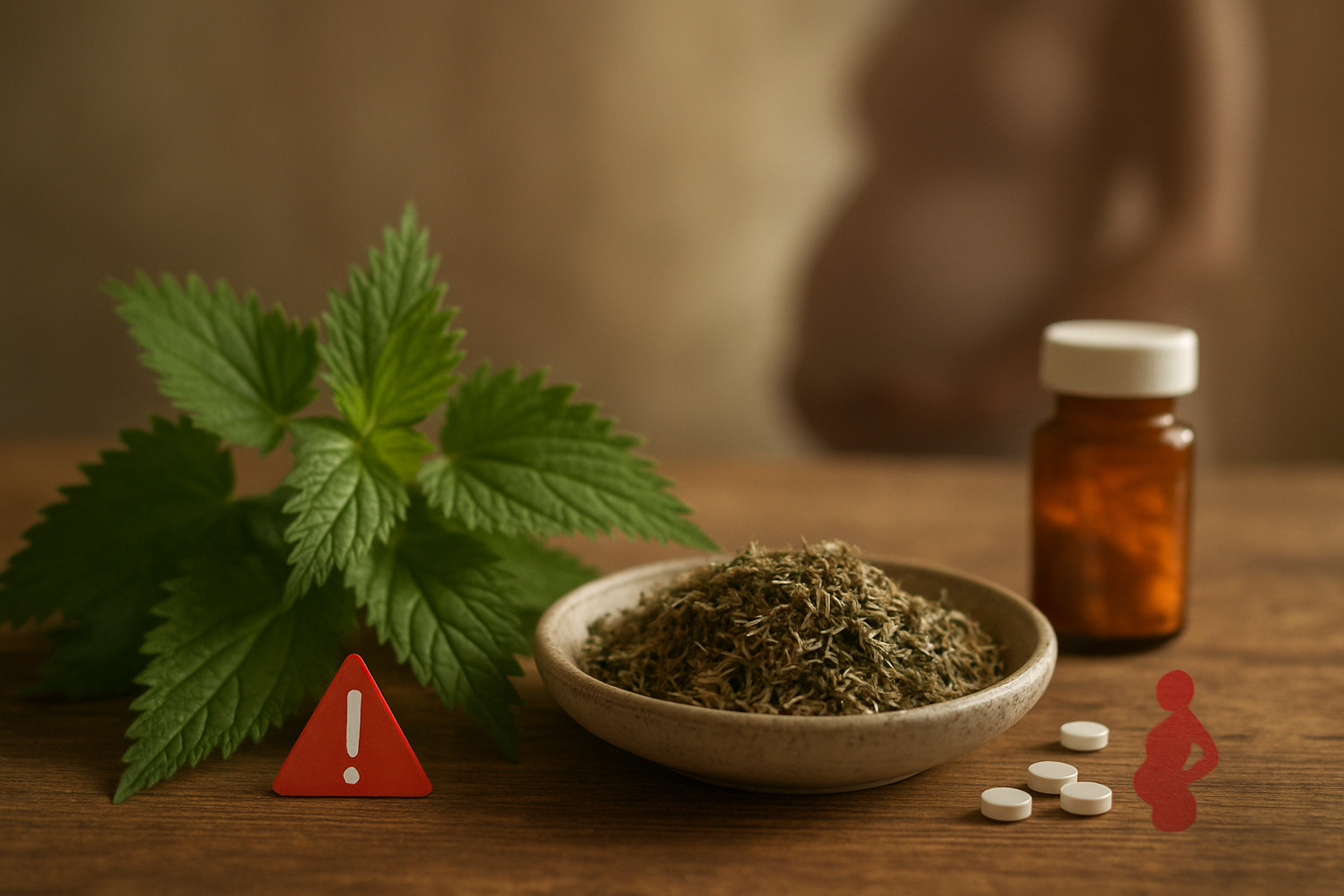
Drug Interactions with Blood Thinners and Diabetes Medications
Nettle tea can interfere with certain medications, creating potentially dangerous situations. If you take blood-thinning medications like warfarin, heparin, or aspirin, nettle tea might increase your bleeding risk. The tea contains compounds that can enhance the effects of these drugs, making your blood clot more slowly than intended.
People managing diabetes need to be extra careful too. Nettle tea may lower blood sugar levels, which sounds helpful but can actually cause problems when combined with diabetes medications. This combination might drop your blood sugar too low, leading to hypoglycemia – a condition that can cause dizziness, confusion, and in severe cases, loss of consciousness.
| Medication Type | Potential Risk | Recommended Action |
|---|---|---|
| Blood Thinners | Increased bleeding risk | Consult doctor before use |
| Diabetes Medications | Low blood sugar | Monitor glucose closely |
| Blood Pressure Medications | Excessive pressure drop | Medical supervision needed |
Always talk to your healthcare provider before adding nettle tea to your routine if you take any medications regularly. They can help you understand whether the timing of your tea consumption matters or if you should avoid it entirely.
Allergic Reactions and Skin Sensitivity Issues
Some people experience allergic reactions to nettle tea, even though the fresh plant’s sting is neutralized during the drying and brewing process. Common allergic symptoms include hives, itching, swelling of the face or throat, and difficulty breathing. These reactions can happen even if you’ve never had problems with other herbal teas.
Skin sensitivity is another concern. Some people develop rashes or experience increased sensitivity to sunlight after drinking nettle tea regularly. This photosensitivity can make you more prone to sunburns and skin irritation when exposed to UV rays.
Watch for these warning signs:
- Itchy or burning sensation in your mouth or throat
- Stomach upset or nausea after drinking the tea
- Skin rashes appearing hours or days after consumption
- Unusual fatigue or dizziness
If you have a history of plant allergies, especially to other members of the nettle family, start with very small amounts. Try a few sips and wait 24 hours to see how your body responds before drinking a full cup.
Pregnancy and Breastfeeding Safety Concerns
Pregnant women should avoid nettle tea, especially during the first trimester. The tea can stimulate uterine contractions, potentially increasing the risk of miscarriage or premature labor. Some compounds in nettle may also affect hormone levels, which could disrupt normal pregnancy development.
During breastfeeding, nettle tea’s safety remains unclear. While some traditional practices suggest it might help with milk production, there’s not enough scientific evidence to confirm this benefit or rule out potential risks to the baby. The compounds in nettle tea can pass through breast milk, and we don’t fully understand how they might affect a developing infant.
Specific pregnancy risks include:
- Uterine stimulation that could trigger contractions
- Potential interference with fetal development
- Unknown effects on hormonal balance during pregnancy
- Possible interactions with prenatal vitamins or supplements
If you’re trying to conceive, pregnant, or breastfeeding, it’s best to skip nettle tea entirely. There are plenty of other safe herbal options like ginger tea for nausea or chamomile for relaxation that have better-established safety profiles during this important time.
Simple Methods for Preparing Perfect Nettle Tea
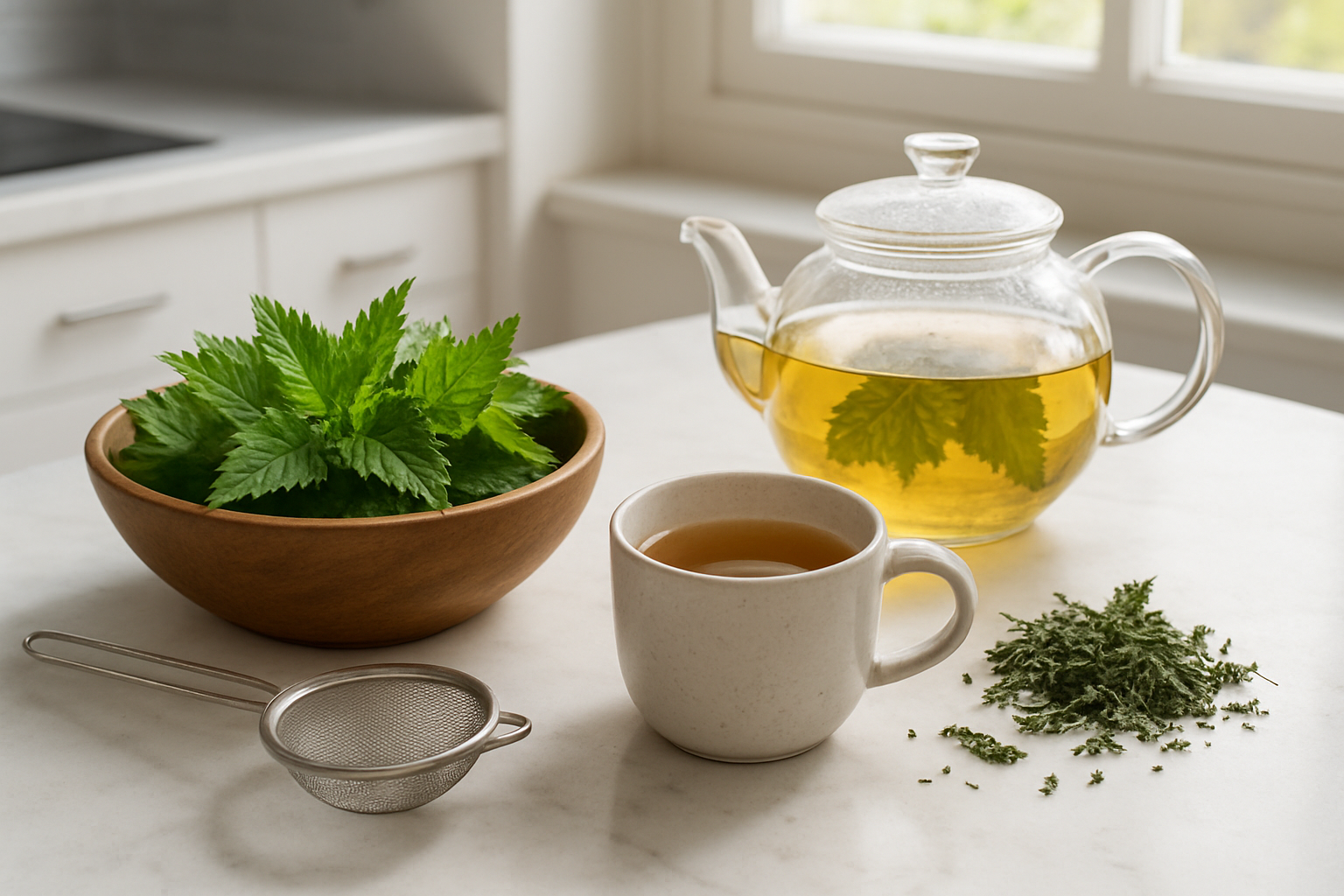
Harvesting and Handling Fresh Nettles Safely
Timing matters when collecting wild nettles. The best harvesting window falls between early spring and late summer, with younger leaves offering the most delicate flavor. Look for plants with bright green, serrated leaves that haven’t yet flowered – flowering indicates the leaves have become more bitter and potentially less nutritious.
Always wear thick gloves and long sleeves when handling fresh nettles. The stinging sensation comes from tiny hairs containing formic acid, which easily penetrate skin. Use garden shears or scissors to cut stems about 4-6 inches from the top, leaving the root system intact for future growth. Choose nettles growing away from roadsides, industrial areas, or chemically treated lawns to avoid contamination.
After harvesting, rinse the nettles thoroughly under cold running water while still wearing gloves. The stinging effect disappears once the leaves are dried or heated, making them completely safe to handle during the brewing process.
Step-by-Step Hot Water Brewing Instructions
Start by measuring your nettle leaves – use about 1 tablespoon of dried nettles or 2-3 tablespoons of fresh leaves per cup of water. If using fresh nettles, roughly chop them to release more nutrients and flavor compounds.
Bring water to a rolling boil, then remove from heat and let it cool for about 30 seconds. The ideal temperature ranges between 195-212°F. Pour the hot water directly over the nettle leaves in your teapot or cup. This initial contact with hot water neutralizes the stinging compounds in fresh nettles.
Cover the container to trap essential oils and prevent nutrient loss through evaporation. The covering also intensifies the flavor extraction process, resulting in a more potent brew.
Cold Brew Technique for Milder Flavor
Cold brewing produces a gentler, less astringent nettle tea that many people find more palatable. This method works particularly well for those sensitive to bitter flavors or planning to drink large quantities throughout the day.
Combine 1/4 cup of dried nettles with 4 cups of cold, filtered water in a glass jar or pitcher. Stir the mixture gently to ensure all leaves are saturated. Cover and refrigerate for 6-12 hours, depending on your desired strength preference.
Strain the mixture through a fine-mesh strainer or cheesecloth, pressing the leaves gently to extract remaining liquid. The resulting tea keeps fresh in the refrigerator for up to 3 days. Cold-brewed nettle tea contains fewer tannins, making it naturally sweeter and easier on sensitive stomachs.
Optimal Steeping Times and Tea Strength Guidelines
Steeping time directly influences both flavor intensity and nutrient extraction. For hot-brewed nettle tea, steep for 5-10 minutes for a mild tea, 10-15 minutes for medium strength, and 15-20 minutes for a robust, full-bodied brew.
| Strength Level | Steeping Time | Flavor Profile | Best Uses |
|---|---|---|---|
| Mild | 5-10 minutes | Light, grassy | Daily hydration, beginners |
| Medium | 10-15 minutes | Balanced, earthy | General wellness support |
| Strong | 15-20 minutes | Bold, mineral-rich | Therapeutic purposes |
Avoid steeping longer than 20 minutes, as this can result in excessive bitterness without significantly increasing nutritional benefits. The optimal balance occurs around 12-15 minutes, where you maximize nutrient extraction while maintaining pleasant taste.
Fresh nettles generally require slightly longer steeping times compared to dried leaves due to their higher moisture content and intact cell structure. Taste-test your brew at different intervals to find your personal preference sweet spot.
Maximizing Benefits Through Proper Consumption
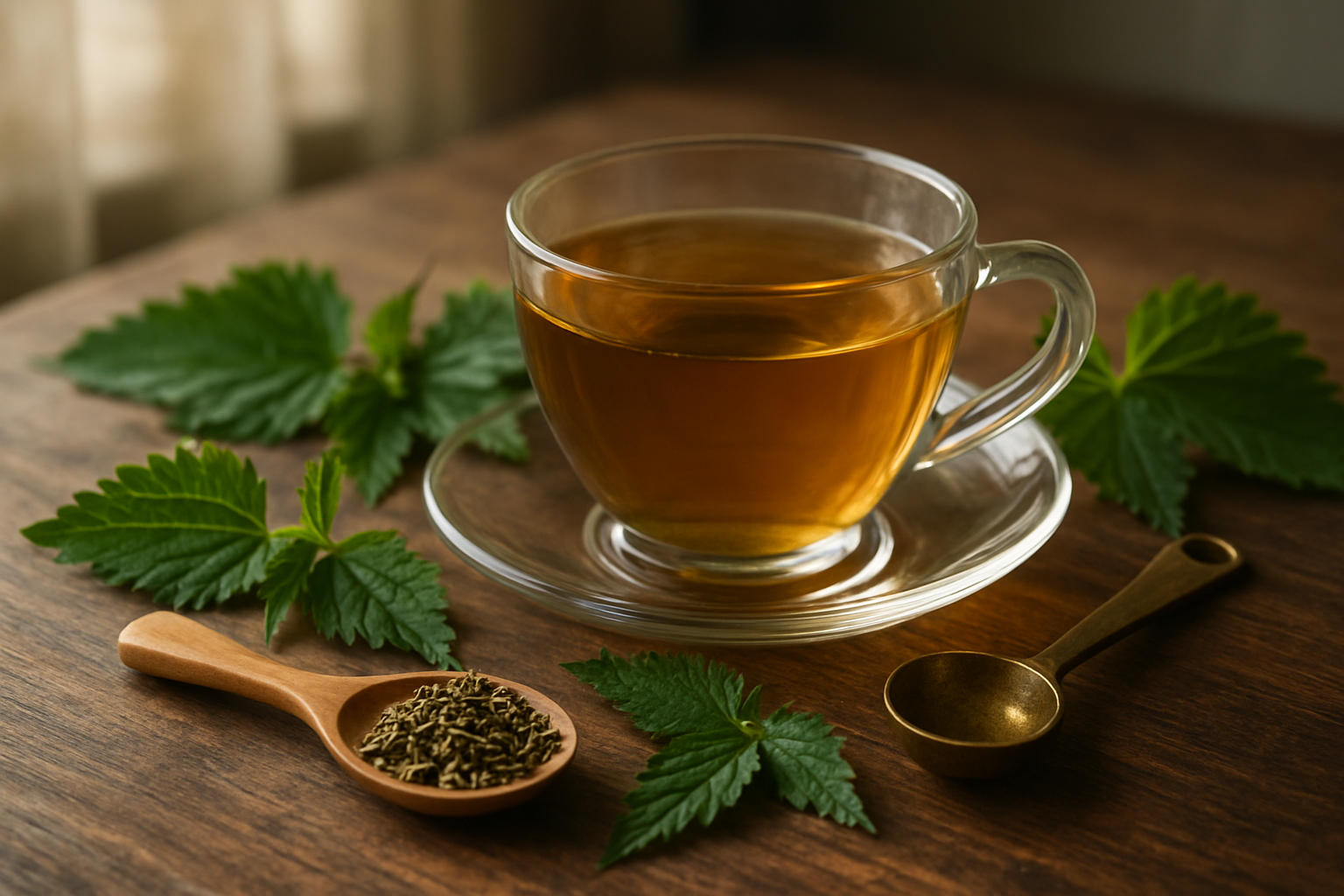
Best Times of Day to Drink Nettle Tea
Your body responds differently to nettle tea depending on when you drink it. Morning consumption works best for energy support and allergy relief. The tea’s natural vitamins and minerals help kickstart your metabolism and provide steady energy without the crash that comes with caffeine.
If you’re dealing with seasonal allergies, drinking nettle tea first thing in the morning creates a protective barrier before you encounter allergens. Many people find this timing reduces sneezing and congestion throughout the day.
For joint pain and inflammation, split your consumption between morning and early afternoon. This spacing helps maintain consistent anti-inflammatory compounds in your system. Avoid drinking nettle tea too close to bedtime, as its mild diuretic effect might disrupt your sleep with bathroom trips.
Those using nettle tea for iron deficiency should drink it between meals rather than with food. This timing improves iron absorption since certain compounds in foods can interfere with mineral uptake.
Recommended Daily Dosage for Different Health Goals
The right amount of nettle tea depends on what you’re trying to achieve. For general wellness and daily nutrition, one to two cups per day provides adequate benefits without overwhelming your system.
| Health Goal | Daily Amount | Timing |
|---|---|---|
| General wellness | 1-2 cups | Morning and afternoon |
| Allergy relief | 2-3 cups | Start 2 weeks before allergy season |
| Joint pain support | 2-3 cups | Split throughout day |
| Iron deficiency support | 1-2 cups | Between meals |
| Prostate health | 2-4 cups | Spread evenly throughout day |
For seasonal allergies, start with three cups daily about two weeks before your typical allergy season begins. This gives your body time to build up the natural antihistamine effects. Once allergy season hits, you can maintain this amount or reduce to two cups if symptoms are well-controlled.
People dealing with enlarged prostate or urinary issues often benefit from higher amounts – up to four cups daily. Start with two cups and gradually increase while monitoring how your body responds.
Never exceed four cups daily, as excessive intake can lead to stomach upset or electrolyte imbalances. If you’re new to nettle tea, begin with one cup daily for the first week to assess your tolerance.
Combining Nettle Tea with Other Beneficial Herbs
Nettle tea plays well with many other herbs, creating powerful combinations that enhance specific health benefits. For allergy relief, blend nettle with elderberry and peppermint. Elderberry adds antioxidant power while peppermint soothes respiratory irritation and makes the blend more pleasant to drink.
Red clover pairs beautifully with nettle for hormonal support, especially during menopause. Both herbs contain compounds that help balance estrogen levels naturally. Add a small amount of spearmint to improve the flavor profile of this combination.
For joint health and inflammation, try mixing nettle with turmeric and ginger. Turmeric brings potent anti-inflammatory curcumin, while ginger adds warming properties and aids digestion. This trio works together to target inflammation from multiple angles.
Dandelion root creates an excellent liver-supporting blend with nettle. Both herbs support detoxification pathways, and dandelion’s bitter compounds stimulate digestive function. This combination works particularly well for people dealing with skin issues related to poor elimination.
When blending herbs, use nettle as your base – about 60% of the mixture – and add complementary herbs in smaller amounts. Start with equal parts of your chosen herbs, then adjust ratios based on taste preferences and desired effects. Steep blended teas for the same duration as pure nettle tea, typically 10-15 minutes for maximum extraction.
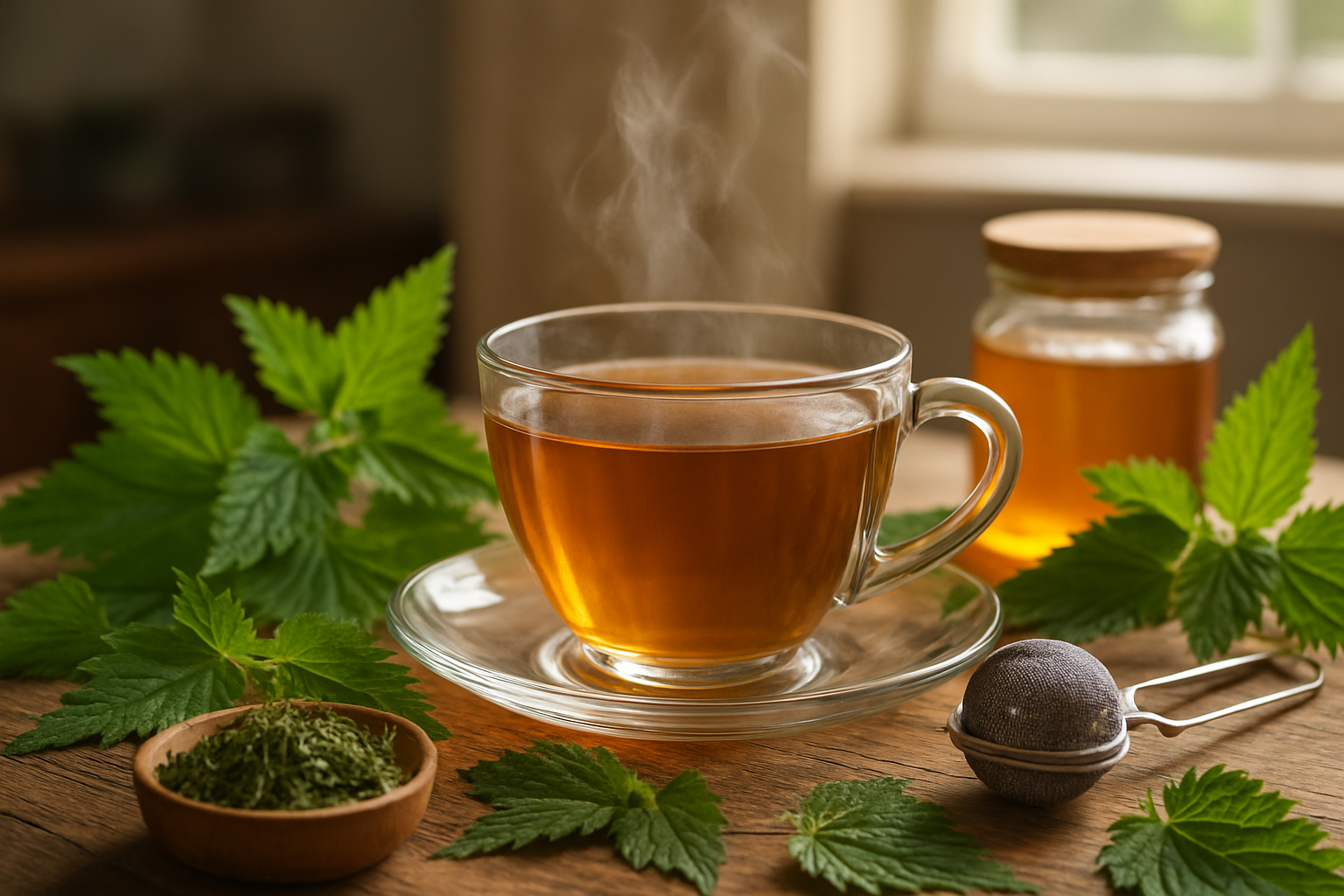
Nettle tea offers a powerful blend of vitamins, minerals, and antioxidants that can support your overall health in meaningful ways. From reducing inflammation and supporting kidney function to providing essential nutrients like iron and vitamin C, this herbal remedy has earned its place in natural wellness routines. While most people can enjoy nettle tea safely, remember to start with small amounts and watch for any allergic reactions, especially if you’re pregnant, breastfeeding, or taking medications.
Getting the most from nettle tea is surprisingly simple – just steep dried leaves in hot water for 5-10 minutes and enjoy 1-2 cups daily. The key is consistency and listening to your body’s response. If you’re looking for a natural way to boost your nutrient intake and support your health, nettle tea could be the gentle, effective addition your daily routine needs. Give it a try and see how this time-tested herbal tea can work for you.
